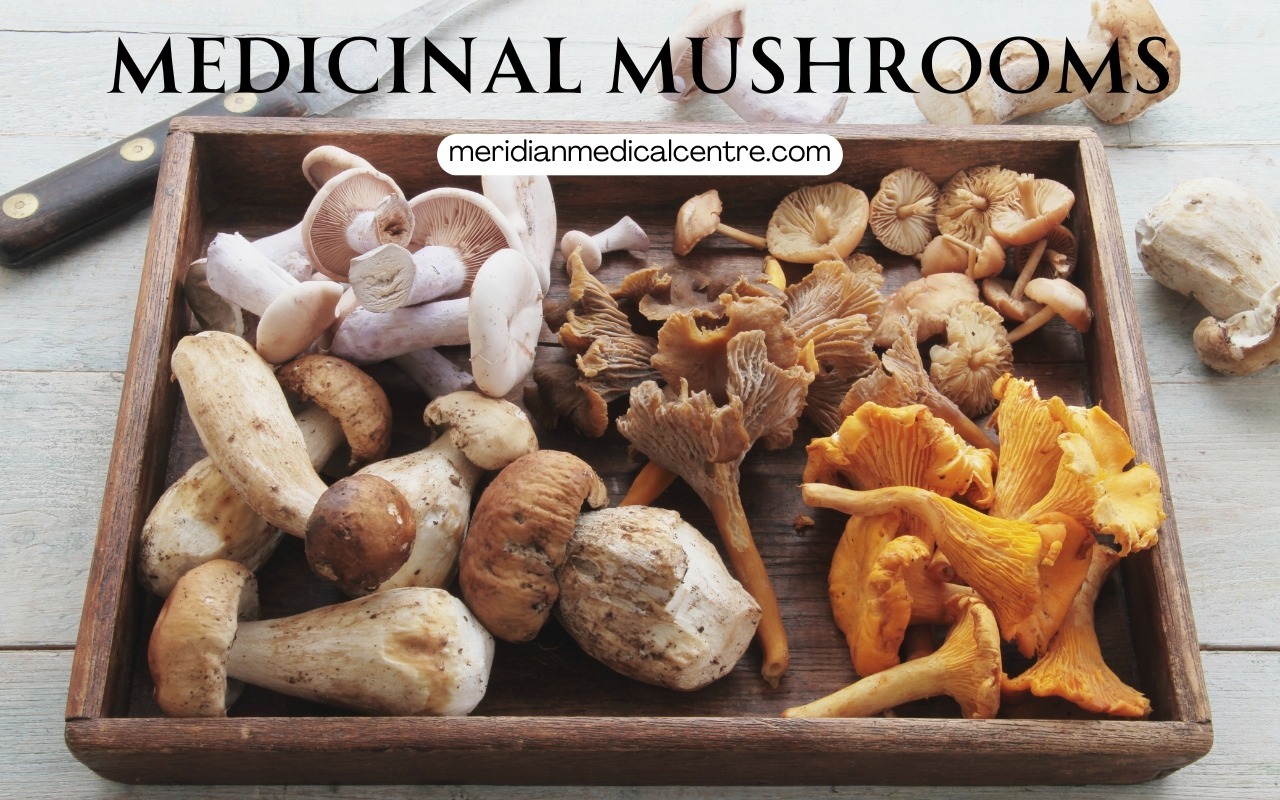
Meridian Medical Centre provides evidence-based, informative content on natural wellness approaches that complement clinical care. Our focus is on empowering individuals to make informed health choices, with content rooted in scientific research and professional expertise. While we recognize the role of holistic health solutions, we emphasize the importance of consulting healthcare professionals for personalized medical guidance. Our approach is ethical, transparent, and accessible, ensuring that readers receive trustworthy health information that integrates natural and clinical solutions for better health outcomes.
A Data-Driven Analysis of Medicinal Mushrooms and Cognitive Function
The neuroprotective properties of medicinal mushrooms are increasingly supported by clinical research, suggesting their role in cognitive enhancement, neurogenesis, and neuroprotection.
This article provides a scientific examination of how medicinal mushrooms influence brain health, memory, and neuronal regeneration, while also offering guidance on selecting high-quality mushroom supplements.
Neuroprotective Mechanisms of Medicinal Mushrooms
1. Enhancing Nerve Growth Factor (NGF) and Neurogenesis
Certain medicinal mushrooms, particularly Lion’s Mane (Hericium erinaceus), have demonstrated the ability to stimulate NGF, a protein essential for the growth, survival, and repair of neurons.
Clinical Evidence:
- A 2020 study in Frontiers in Aging Neuroscience found that Lion’s Mane extract improved cognitive function in older adults with mild cognitive impairment (MCI).
- A 2018 preclinical trial demonstrated that hericenones and erinacines (bioactive compounds in Lion’s Mane) promoted nerve regeneration in animal models.
2. Anti-Inflammatory and Antioxidant Properties in the Brain
Chronic inflammation and oxidative stress are major contributors to neurodegeneration. Mushrooms such as Reishi (Ganoderma lingzhi), Turkey Tail (Trametes versicolor), and Chaga (Inonotus obliquus) have been studied for their role in reducing neuroinflammation and oxidative damage.
Clinical Evidence:
- A 2021 study in Antioxidants found that bioactive polysaccharides in Reishi and Turkey Tail mushrooms reduced neuroinflammation in patients with neurodegenerative disorders.
- A 2020 review in the Journal of Alzheimer’s Disease highlighted that Chaga extract reduced amyloid-beta accumulation, a key factor in Alzheimer’s pathology.
3. Enhancing Cognitive Function and Memory
The neuroprotective effects of medicinal mushrooms have been linked to improved cognitive performance, enhanced memory, and learning ability.
Clinical Evidence:
- A 2019 study in the Journal of Medicinal Food demonstrated that individuals consuming Lion’s Mane extract for 16 weeks showed significant improvements in memory recall and verbal learning.
- A 2018 systematic review concluded that mushroom-derived bioactive compounds modulated neurotransmitter activity, potentially delaying cognitive decline.
The Top Medicinal Mushrooms for Brain Health
1. Lion’s Mane Mushroom: The Cognitive Enhancer (Hericium erinaceus)
- Primary Benefits: Enhances NGF production, promotes neurogenesis, and supports cognitive function.
- Best Evidence: Shown to improve memory recall, focus, and neuronal repair in clinical trials.
- Recommended Use: ½ tsp daily in coffee, tea, or smoothie.
2. Reishi Mushroom: The Stress Modulator (Ganoderma lingzhi)
- Primary Benefits: Reduces neuroinflammation, promotes stress resilience, and supports mood regulation.
- Best Evidence: Studies support its role in calming the nervous system and improving sleep quality.
- Recommended Use: 2 capsules daily for long-term benefits.
3. Cordyceps Mushroom: The Oxygenator (Cordyceps militaris)
- Primary Benefits: Enhances cerebral oxygenation, boosts ATP production, and supports mitochondrial health.
- Best Evidence: Improves cognitive endurance and mental clarity in physically active individuals.
- Recommended Use: ½-1 tsp daily before exercise or mental tasks.
4. Chaga Mushroom: The Antioxidant Powerhouse (Inonotus obliquus)
- Primary Benefits: Protects neurons from oxidative stress, supports immune modulation, and enhances DNA repair.
- Best Evidence: Studies indicate its role in reducing oxidative damage linked to neurodegenerative disorders.
- Recommended Use: Brewed as tea or consumed in supplement form.
5. Turkey Tail Mushroom: The Immuno-Neuromodulator (Trametes versicolor)
- Primary Benefits: Enhances immune-brain communication, supports the gut-brain axis, and promotes neuroprotection.
- Best Evidence: Associated with improved immune surveillance and reduced brain inflammation.
- Recommended Use: ½ tsp in warm water or smoothies daily.
How to Choose a High-Quality Medicinal Mushroom Supplement
1. Understanding Fruiting Body vs. Mycelium
- Fruiting Body: Contains the highest concentration of beta-glucans, triterpenes, and polysaccharides—the bioactive compounds responsible for neuroprotective benefits.
- Mycelium (Root Structure): Often grown on grain, resulting in lower levels of active compounds and higher starch content.
2. Identifying Standardized Extracts
- Look for products that list the percentage of beta-D-glucans and polysaccharides.
- Avoid fillers such as rice or oat powders, which dilute potency.
3. Choosing a Trusted Source
- Opt for third-party tested products to verify purity and efficacy.
- Ensure the product contains only organic, fruiting body extracts.
Final Thoughts: The Future of Medicinal Mushrooms in Cognitive Health
The growing body of scientific research supports the role of medicinal mushrooms in cognitive function, neuroprotection, and neurogenesis. Mushrooms such as Lion’s Mane, Reishi, Cordyceps, Chaga, and Turkey Tail have been demonstrated to enhance brain health, reduce neuroinflammation, and support mental clarity.
At Meridian Medical Centre, we emphasize evidence-based interventions for optimal brain health. If incorporating medicinal mushrooms into your wellness routine, prioritize high-quality extracts from fruiting bodies to maximize cognitive benefits.
For personalized recommendations, consult a healthcare provider or clinical nutritionist to ensure the safe and effective integration of medicinal mushrooms into your regimen.